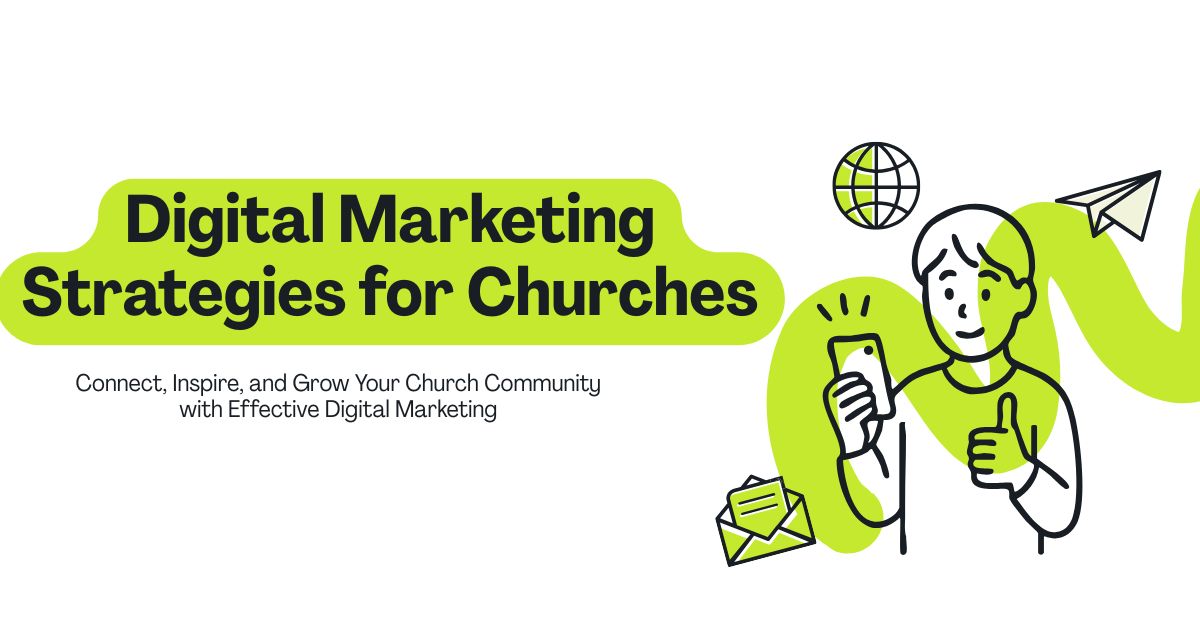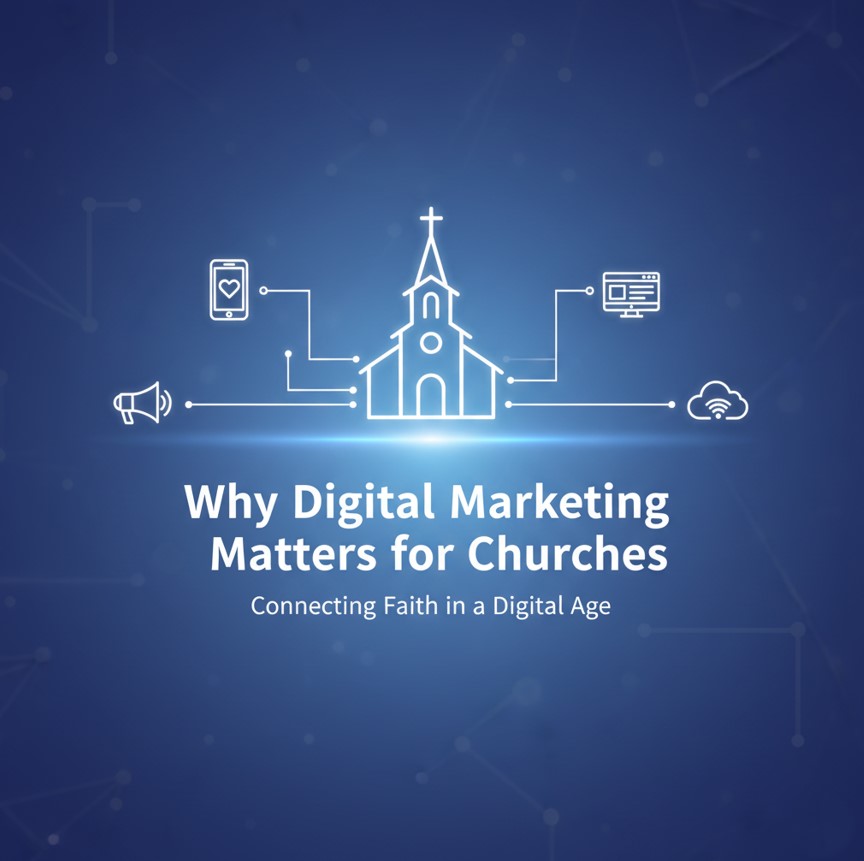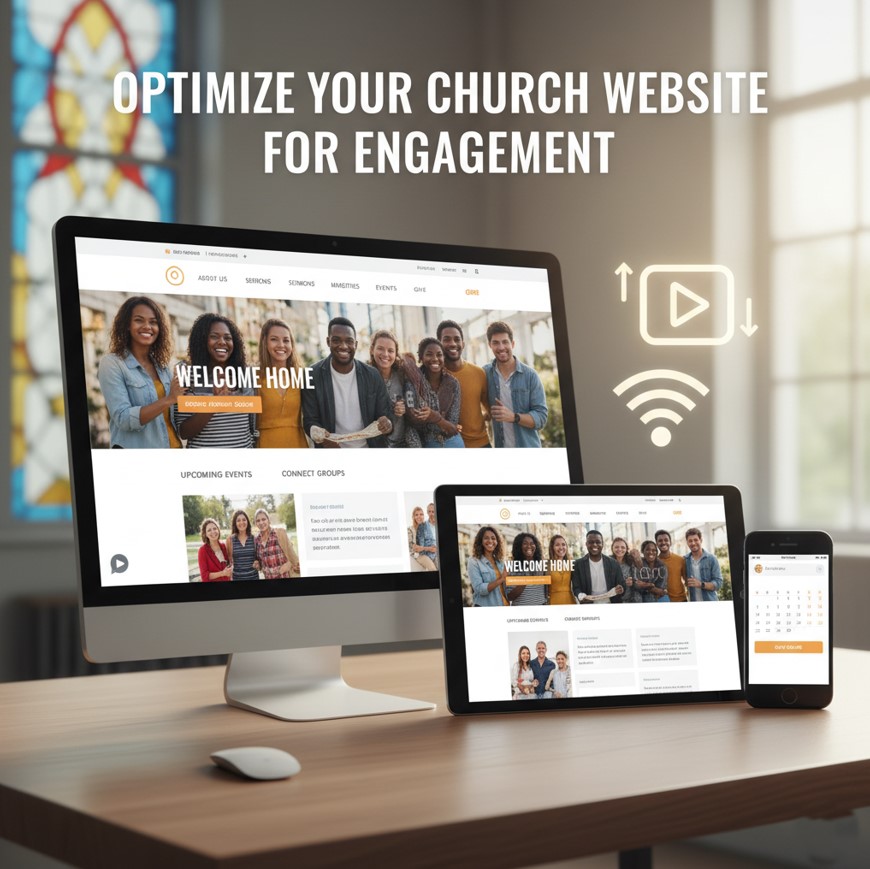
The digital age has transformed how we connect, communicate, and share our faith. Churches, which have long served as the heart of their communities, now have an unprecedented opportunity to reach beyond their physical walls and engage with audiences online. But where do you begin with digital marketing? How can your church balance technology with its mission?
Why Digital Marketing Matters for Churches
Digital marketing isn’t just for businesses or influencers. It’s a powerful tool for churches to connect with current members, reach potential attendees, and share their mission with larger audiences.
- Reach a wider audience: Nearly five billion people worldwide use the internet. Platforms like social media, email, and search engines provide the perfect avenue for spreading your message far and wide.
- Maintain relevance: More people, especially younger generations, turn to digital platforms for educational resources and community building. Being active online helps your church stay relevant to these groups.
- Deepen member engagement: Use digital tools to keep your congregation informed about events, share uplifting content throughout the week, and provide opportunities for online fellowship.
With the right strategies, digital marketing can help grow your congregation while fostering a sense of connection and community.

Social Media Is Your Mission Field
Choose the Right Platforms
Not all social media platforms are created equal. Focus on platforms where your audience spends the most time. For churches, Facebook and Instagram are particularly impactful for engaging with families and younger adults, while YouTube is perfect for sharing sermons or inspirational videos.
Post Consistently
Regular posting keeps your followers engaged. Share a mix of:
- Sermon previews and recaps
- Bible verses with inspirational reflections
- Event announcements
- Behind-the-scenes glimpses of church life
Use scheduling tools like Buffer or Later to plan posts and maintain consistency.
Create Engaging Content
Social media thrives on authenticity and connection. Here are some ideas that can resonate with your audience:
- Share testimonies or stories of faith from members of your church.
- Host live-streams for prayer requests or Q&A sessions with your pastor.
- Post family-friendly challenges like Bible verse memorization or acts of kindness.
Use Paid Advertisements
Social media platforms like Facebook allow churches to run targeted advertisements. Use these to promote special events, such as holiday services, community outreach programs, or small group gatherings.
Pro Tip: Target ads to people within a specific radius of your church to attract local attendees.
Optimize Your Church Website for Engagement

Why Your Website Matters
Your church website is your digital front door. It’s often the first impression potential visitors will have, so it needs to be welcoming, easy to use, and provide the information people are looking for.
Key Features Your Website Should Include
- Clear service times and location on the homepage.
- An “I’m New” section with FAQs to make newcomers feel comfortable.
- The ability to watch or stream sermons online.
- Opportunities for donations or tithes via an easy-to-use giving platform.
- A calendar for upcoming events.
SEO for Churches
Search engine optimization (SEO) ensures your church can be found on Google. Here’s how to optimize your site:
- Use keywords like “church near me,” “family-friendly church,” or “Sunday service times.”
- Claim your Google My Business listing and ensure it provides accurate information.
- Include location-based keywords (e.g., “Christian church in Phoenix”) throughout your site.
Pro Tip: Create a blog section on your website where you share sermon recaps, devotionals, or articles about living out faith. This helps with SEO and keeps visitors engaged.
Grow Your Email List
Why Emails Still Work
Email marketing allows you to directly communicate with your congregation and leads. It’s a personal and effective way to keep people informed, no matter their age group.
Build Your List
- Add a signup form to your website with a clear call to action (e.g., “Subscribe for weekly devotionals”).
- Encourage visitors at church events to share their email address.
- Offer free downloadable resources like Bible study guides or devotional PDFs as incentives.
What to Email
A successful church email strategy includes:
- Weekly newsletters with announcements and prayer points.
- Reminders for upcoming events, workshops, or retreats.
- Encouraging messages or devotionals to uplift your readers midweek.
Remember to personalize emails whenever possible. A simple “Dear [Name]” can make your emails feel much more personal and meaningful.
Pro Tip: Use email marketing tools like Mailchimp or Constant Contact to easily manage and schedule emails.
Live Streaming and Video Content
Video content is an incredibly impactful way to connect with both members and broader audiences. Churches that created their live streaming systems during the pandemic are now seeing ongoing benefits as they continue to reach new people who may not attend in person.

Live Streaming
- Stream Sunday services, Bible studies, or prayer meetings on platforms like Facebook Live or YouTube Live.
- Ensure you have quality audio and visuals, as this reflects directly on your church’s brand.
Pre-Recorded Videos
Pre-record videos if you want to share polished content. Some ideas include:
- Weekly teaching videos or devotionals from your pastor.
- Highlights from recent events.
- Member testimonials about personal journeys of faith.
Pro Tip: Keep videos conversational and within 3–5 minutes to maximize engagement.
Foster Community Through Digital Outreach
Churches aren’t just about Sunday services; they’re about building a community of faith. Digital marketing provides numerous ways to foster that sense of belonging.
- Create an online group using Facebook Groups or platforms like Mighty Networks where members can share prayer requests, stories, and support one another.
- Host virtual Bible study groups for those who can’t attend in person.
- Send personalized invitations for events, making people feel valued and included.
Strengthen relationships by being genuinely invested in your members’ lives. The key is to use digital tools to keep the connection alive beyond Sunday mornings.
Actionable Next Steps for Your Church
Digital marketing opens a world of opportunities for churches to spread their message, engage their communities, and grow their congregations. Here’s a quick recap of steps your church can take to boost its digital footprint:
- Start posting consistent content on the social media platforms your audience uses.
- Ensure your website is optimized for visitors and includes key information.
- Grow your email list and use it to engage with members regularly.
- Tap into video content for maximum reach and connection.
- Foster an online community to build relationships beyond Sunday worship.
Are you ready to amplify your church’s mission online? Small efforts today can lead to significant impacts tomorrow.

Leave a Reply